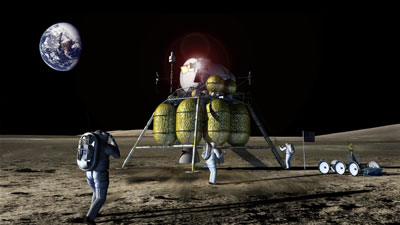|
|
 Should the next president continue plans for a human return to the Moon, or put that funding towards applications in “near space”? (credit: NASA) |
Obama’s space
by Amitai Etzioni
Monday, July 28, 2008
I’m flattered that The Space Review paid any mind at all to my polemical book against the space race, published in 1964 (see “Kennedy versus Obama on space”, The Space Review, July 21, 2008). Its title, The Moon-Doggle, tells you something about the tone of the book. However, I hold that history was surprisingly kind to the thesis of the book. I argued that we shall reap many more benefits in near space than in deeper space. I suggested that the notions that we would find precious material on the Moon, use it as a base to fire missiles at the USSR, or use it to gain great new bodies of knowledge, or even “merely” impress the world, were mistaken. The greatest benefits, such as weather satellites, intelligence gathering, and even travel, were all in near space. I doubt that anybody disagrees about this point today. I also argued that unmanned (you could say that in those days) spacecraft were much less costly and much safer than manned ones. It is a thesis that was well supported by the loss of life that followed manned flights.
Michael Huang’s observation in his article that Boeing is not going to like such a reallocation of funds is true enough. But it does not take into account that Boeing’s board is not the proper level on which such decisions ought to be made. We are talking about public funds, and priority for them should be set by Congress and the President with as little interference from moneyed lobbyists as possible. However, if Boeing wants to develop a spacecraft on its own dime, I surely have no objections.
Also, I would love to see less PR and more candor in the discussion on space exploration. The other day I saw some space photos issued by NASA which were in red, white, and blue. When I asked if God was an American, and if he had arranged the universe in our colors, I was told that these photos were “augmented”. Other computer devices were used to turn what was largely “snow” (of the kind you see on a malfunctioning TV screen) into images of planets.
NASA, and the people who live off of its grants and contracts, keep telling the media that we may find life on Mars. Many people understand this to mean some civilization with which we could ally ourselves against the bad guys. If NASA would disclose that it is looking for some organic material we would be better prepared to have an honest discussion about how much the nation should pay for such a possible discovery. The same holds for claims that we learn about the beginning of the universe and expand our humanity and other such bull.
Barack Obama should review our space program. He should remind NASA that it is against the law to propagandize the people. And he should junk schemes for manned flights and deep space adventures for unmanned projects in near space.
Amitai Etzioni is a University Professor at The George Washington University and author of Security First: For A Muscular, Moral Foreign Policy.
|
|